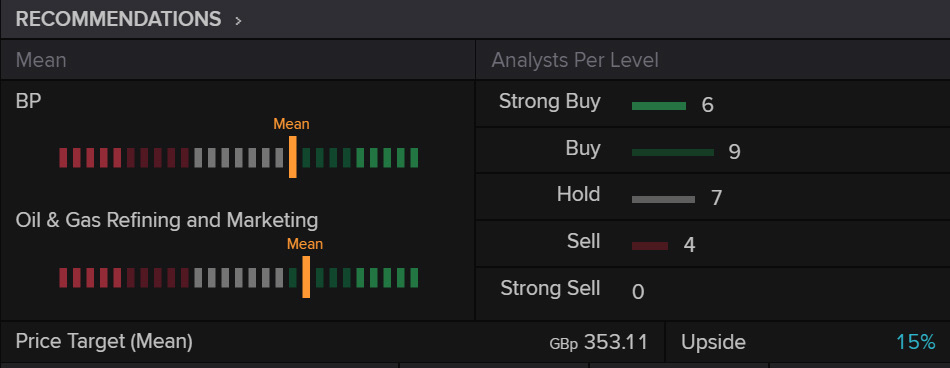The combination of a share buyback and a (higher) dividend payout could push BP’s share price significantly higher over the coming months and years. If everything goes according to plan, shareholders can expect a total cash return of 8% to 11% per share from 2022 onwards — considerably more than what the major industry peers are offering. We’re aiming for a 30% to 40% price increase. Shares Under Ten is therefore adding 1,250 BP shares to the portfolio at a price of 310 GBX.
A Turbulent Year
It’s fair to say that 2020 was an exceptionally turbulent year for oil companies. The sharp drop in oil prices put significant pressure on energy stocks — BP included. And while oil prices have since recovered, the share price has yet to fully rebound, nor has the damage to investor confidence been completely repaired. This is despite the fact that a barrel of crude oil (West Texas Intermediate) is currently trading above pre-pandemic levels. That said, BP still holds some strong cards that could pave the way for a higher share price. The announcement of a new share buyback program could provide the stock with a solid boost. As BP continues to reduce its debt load, this program may soon become a reality. At the same time, the company faces major challenges in the form of the energy transition, which will take shape over the coming years. BP appears well-positioned to play a key role in this transition — although the real test is still ahead. The Shares Under Ten team believes that BP is due for a re-rating, and that this stock still has plenty of potential — both in the short and long term. Especially now that profit forecasts for BP have recently been revised upward. A Buy recommendation is well warranted here.
Company Profile
BP Plc is one of the major players in the global energy sector, operating across four main divisions: Gas & Low Carbon Energy, Oil Production & Operations, Customer & Products, and its stake in Rosneft. As a fully integrated oil company, BP is active both upstream (exploration and production of oil and gas) and downstream (refining, marketing, and sale of petroleum products). In short, BP has a presence across nearly all segments of the energy market. Founded in 1908 and headquartered in London, BP experienced one of the toughest years in its long history in 2020. The sharp drop in oil prices during the first half of the year pushed the company’s results into the red, forcing BP to cut its dividend by half. The dividend for Q2 2020 was just under half of what it had been in Q1. In response, management pledged to compensate shareholders through share buybacks—provided the company continued to reduce its debt levels. Looking further ahead, BP, like all major oil companies, is facing increasing pressure from consumers and regulators to transition to more sustainable energy sources. The era of ever-growing demand for crude oil and fossil fuels is coming to an end—a fact that CEO Bernard Looney has openly acknowledged. BP was the first of the majors to admit that an era had ended—one many believed would continue for at least another decade. In a widely discussed report, BP stated that global oil demand may never return to pre-COVID-19 levels. The company outlined a new vision for the future, aligning its operations with the goals of the Paris Climate Agreement. Just six months after taking the helm, Looney made headlines by declaring that global oil and gas production is expected to decline by 40% over the next decade. BP plans to invest as much as $5 billion annually in building one of the world’s leading renewable energy businesses. If Looney’s strategy succeeds, BP could emerge as a sector leader—with a strong presence in both fossil fuels (which will remain part of the energy mix for years to come) and renewable energy.

Conclusion
In the short to medium term, BP’s share price could be supported by a continued recovery in oil prices, driven by the ongoing global economic rebound. What worked against BP during the COVID crisis may now turn in its favor. On top of that, the company has already signaled its intention to launch a new share buyback program. We expect this to be announced once net debt falls below $35 billion — a threshold BP stated was reached in the first quarter of 2021. The buyback announcement is anticipated sometime in the second half of this year.
Starting next year, more than $1 billion could be allocated to buybacks, potentially rising to over $4 billion in 2022. Management has committed to returning at least 60% of available cash to shareholders. The combination of share buybacks and (increased) dividend payouts could lift BP’s share price substantially over the coming months and years. If all goes according to plan, shareholders may expect a total cash return of 8% to 11% per share from 2022 onwards — significantly more than BP’s main industry peers are currently offering.
Naturally, oil price movements remain a key factor. BP is currently operating at a breakeven level of $45 per barrel — a price we are well above at present. Further cost efficiencies could lower that breakeven point to as little as $36 per barrel. In the longer term, BP’s performance will also depend on the progress it makes in its transition to renewable energy. The company has already taken the lead over many of its competitors in this space, which offers strong potential going forward. Based on current fundamentals, a Buy rating is well justified. We expect BP to outperform most of its peers, with a potential share price increase of around 40%.
As a result, Shares Under Ten is adding 1,250 BP shares to the portfolio at a price of 310 pence per share. Although the company is often discussed in dollar terms, we recommend buying the shares where they are most actively traded — on the London Stock Exchange. This is where the stock is most liquid and where the price is ultimately determined, giving investors better execution and access.
Pros
- Debt reduction is progressing as planned, creating room to reward shareholders
- Oil prices are benefiting from the global economic recovery
- The company is taking a leading role in the energy transition
Cons
- Transition to renewable energy requires heavy investment
- Share price remains highly sensitive to oil price movements
- Long-term challenges are significant

Key Fundamentals – BP Plc
- ISIN Code: GB0007980591
- Ticker Symbol: BP (XLON)
- Share Price (as of 19 May 2021): 310 pence
- 52-Week High:54 pence
- 52-Week Low:52 pence



